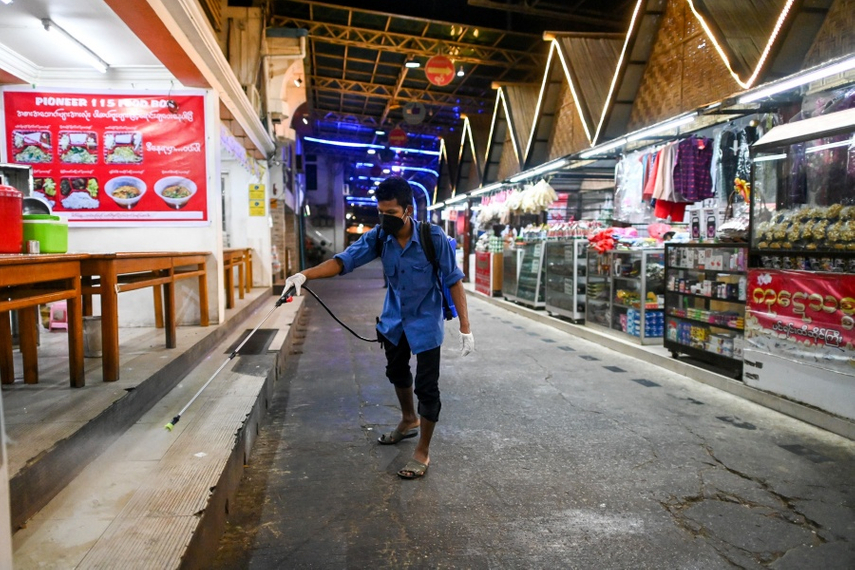
Apr 10, 2020 | News
The ICJ today called upon the Myanmar government to ensure that everyone in the country, particularly those from communities affected by conflict, has access to critical information about COVID-19. This call includes putting an immediate end to restrictions on internet access in Rakhine and Chin States.
The ICJ said that there must not be undue restrictions on the right of people to seek and impart such information, in line with international law and standards protecting the right to freedom of expression and information.
“Access to information is absolutely essential for the protection of communities, especially their right to health during the COVID-19 outbreak,” said Frederick Rawski, ICJ Director for Asia and the Pacific. “This is especially true in areas of Myanmar affected by conflict. The wholesale blocking of internet access in Rakhine and Chin States, including access to websites of popular ethnic media outlets, has no justifiable basis in international law and will only serve to undermine efforts to mitigate the spread of the virus.”
On 26 March 2020, the Minister of Transport and Communications stated in a media interview that despite the COVID-19 pandemic, the internet shutdown in Rakhine and Chin States would not be lifted until hate speech, misinformation and the conflict with the Arakan Army are addressed. The Minister’s statement appears to defy the UN Secretary-General’s appeal for a global ceasefire as well as the respective statements of members of Myanmar’s diplomatic community and of several ethnic armed organizations, including the Arakan Army, to cease hostilities in light of the COVID-19 pandemic. On 9 April 2020, the UN Special Rapporteur on Myanmar called for the same.
Instead, on 30 March 2020, pursuant to section 77 of the Telecommunications Law, the Ministry of Transport and Communications (MoTC) ordered major telecommunications networks to take down hundreds of websites on the dubious ground of containing misinformation. The MoTC did not disclose the full list of websites ordered to be blocked as well as the factual and legal basis that justified issuing the order. Under Section 77, the MoTC can direct a telecommunications provider to suspend services in the event of an “emergency situation.” It is not clear whether the misinformation relates to COVID-19 or if the pandemic is the pretext for the order.
As of 1 April 2020, media outlets of the Rakhine and Karen ethnic communities were among the websites to which access was blocked from major telecommunications providers. Access to Voice of Myanmar’s website, whose editor-in-chief had faced charges under Myanmar’s Counter-Terrorism Law until 9 April 2020 for publishing an interview with the Arakan Army, was also blocked.
The ICJ has previously expressed concern at the Myanmar Government’s use of the Telecommunications Act to justify an internet shutdown in the context of the conflict in Rakhine State. This practice does not comply with human rights law and standards. The Act itself is fundamentally flawed and must be amended. Among other defects, the Act does not define the scope of an “emergency situation.”
“Keeping these overbroad restrictions in place in the midst of the COVID-19 pandemic puts the government in violation of international law. It is also counterproductive to the goal of stopping the spread of the virus and minimizing its impact on the country’s most vulnerable populations,” said Rawski.
Download the statement in Burmese here.
Contact:
Frederick Rawski, ICJ Asia-Pacific Regional Director, e: Frederick.rawski(a)icj.org
Related work:
Event: ICJ hosts workshop on fair trial rights for Myanmar’s ethnic media
Report: Curtailing the Right to Freedom of Expression and Information in Myanmar
Statement: States must respect and protect rights in fighting COVID-19 misinformation
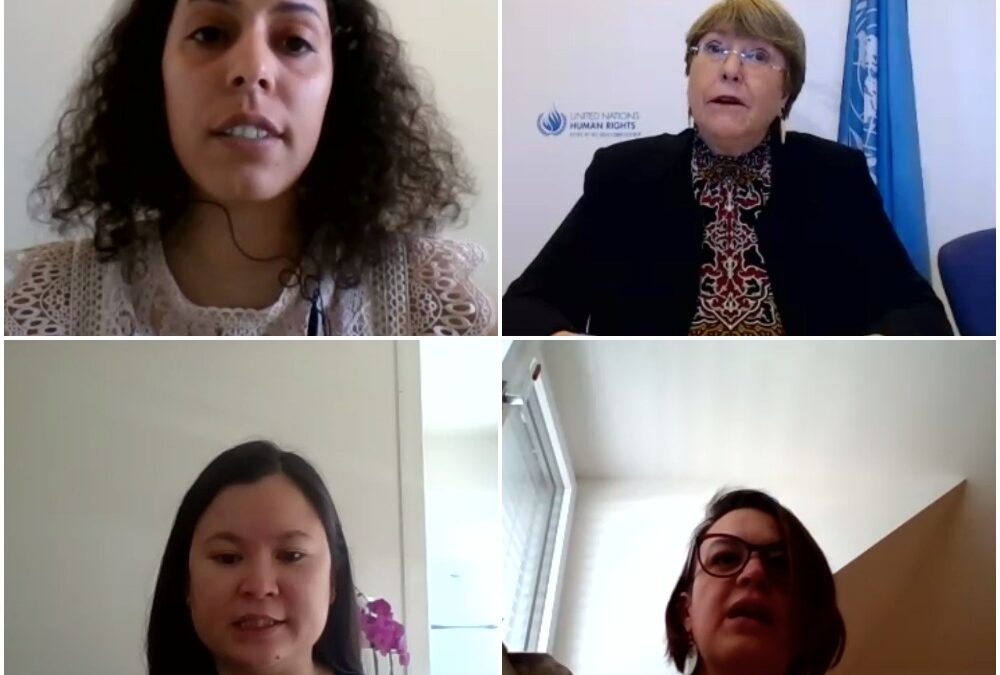
Apr 9, 2020 | Advocacy, Non-legal submissions
The ICJ has joined other NGOs highlighting key human rights issues in the COVID-19 pandemic, at a virtual meeting of the UN Human Rights Council.
In the informal conversation, exceptionally organised by video-conference, the High Commissioner for Human Rights presented a statement, as did the President of the Council and a number of States, followed by several statements by NGOs.
The ICJ joined statements delivered by CIVICUS (on civil and political rights), ISHR (on the UN system response), and FORUM-Asia (on economic, social and cultural rights), on behalf of a large number of NGOs from around the world.
The statements focussed on, among other things:
- the obligations of States individually and collectively to mobilize the maximum available resources to respond to the pandemic and protect those at risk, including by respecting, protecting and fulfilling economic, social and cultural rights;
- the need to guard against abuse of emergency powers and undue restrictions on fundamental rights, including non-discrimination, freedom of expression and right to access information, the right to privacy, rights of persons deprived of liberty, and taking into account the situation of particularly-at-risk groups;
- the role of the Human Rights Council, Special Procedures and Secretary General to monitor, report on, and respond to human rights aspects of the pandemic and States’ responses, and ensuring that civil society continues to be able to participate in all relevant UN and other processes.
The full statements may be downloaded in PDF format here:
Civil and Political Rights: UN-JointStatement-COVID19CPR-2020-final
Economic, Social and Cultural Rights: UN-JointStatement-COVID19ESCR-2020-final
United Nations Mechanisms: UN-JointStatement-COVID19UN-2020-final
Abbreviated versions were delivered in the dialogue, due to the limited time available.
In extensive and detailed closing remarks, the High Commissioner responded to many of the questions and observations made during the discussion, concluding, on the topic of access to justice in times of crisis, as follows (unofficial transcription):
“Courts become more important than ever to safeguard rights in times when major decisions with broad impact are being taken and implemented at great speed. In these circumstances, we have already seen the real risk for abuse of power, legal over-generalization and mistake. The courts must remain available to address these issues, if necessary of course by modifying their working methods. We have seen courts in many countries taking measures to ensure they remain accessible while protecting their staff and clients.”
A video recording of the event can be viewed here.
The High Commissioner’s specific remarks on access to justice can be accessed directly here.
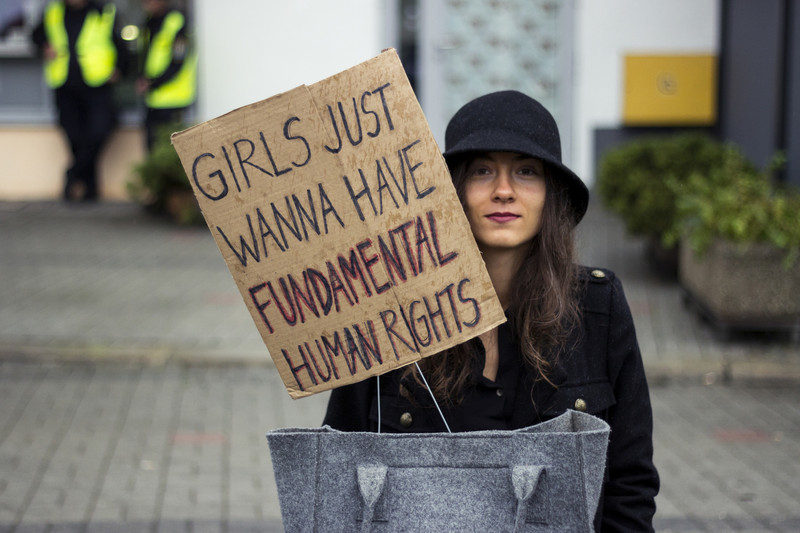
Apr 9, 2020 | Advocacy, News
A joint statement signed by the ICJ and 102 other organizations.
The COVID-19 pandemic and public health crisis is presenting grave challenges for health care systems across Europe.
As European countries work to address the pandemic, protect their populations, and meet the increased demand on health care workers and health care facilities it is vital that they adopt measures to safeguard the health, human dignity, physical and mental integrity, and reproductive autonomy of women and girls in the region.
In many countries the lack of government measures to guarantee individuals’ safe and timely access to essential sexual and reproductive health services, goods, and information during the pandemic is of particular concern.
Women and girls – this statement refers to women and girls, as the majority of individuals who are needing abortion care identify as such but it equally applies to all individuals who may become pregnant and need abortion care or other sexual and reproductive health care – are facing significant restrictions in safely accessing essential sexual and reproductive health services, particularly timely abortion care, post abortion care, and emergency contraception.
Such restrictions disproportionately impact individuals belonging to marginalized groups, including women living in poverty, women with disabilities, Roma women, undocumented migrant women, adolescents, and women at risk or who are survivors of domestic and sexual violence.
These restrictions also create unnecessary risks of exposure to COVID-19 for women and girls and their families as well as for health care providers.
Particularly grave barriers are arising for women and girls living in European countries where abortion care is illegal or severely restricted, and where as a result they must travel to other countries to access legal care or must obtain abortion medication from outside their own jurisdiction.
These issues can also arise in those European countries where individuals are forced to go through burdensome or harmful administrative processes to access abortion care or where they may have difficulty finding doctors in their country willing to provide care.
We applaud those governments that have moved swiftly to safeguard access to essential time- sensitive sexual and reproductive health care during this time, in particular through ensuring access to telehealth and early medical abortion from home.
We call on all other European governments to follow suit and to follow the guidance of medical and public health experts.
We call on the six European countries (Andorra, Liechtenstein, Malta, Monaco, Poland and San Marino) where abortion is illegal or severely restricted to urgently reform these laws, which place women’s health and lives at risk.
Limitations on travel and transport now compound the impact of these highly restrictive laws. Individuals in these countries may no longer be able to travel abroad or to obtain medication for abortion sent by post from medical providers in other countries. As a result, they face heightened risks to their health and wellbeing.
We call on those countries where abortion is legal but where clinical services are unavailable or difficult to access due to a range of barriers, including medically unnecessary requirements that oblige individuals to take multiple or unneeded trips to health care facilities or undergo mandatory hospitalization, to urgently eradicate those barriers and ensure access to services.
Urgent steps should also be taken to ensure that refusals of care because of private beliefs by doctors do not jeopardize timely access to legal abortion care.
In accordance with human rights obligations3 and the recommendations of medical experts4 the following measures should be adopted, and at a minimum remain in place for the duration of the COVID-19 pandemic:
- Ensure that abortion is treated as essential and time-sensitive health care and guarantee access to care in a timely manner.
- Authorize and make available in a timely manner telehealth consultations for anyone who is seeking abortion care or information. Specific measures should be adopted to ensure that telehealth consultations are free or low cost and easily accessible for marginalized groups.
- Guarantee timely access to early medical abortion throughout each jurisdiction and allow doctors to prescribe the necessary medication via telehealth consultation.
- Allow individuals to take all abortion medication at home. Requirements in some European countries that one pill must be taken in the physical presence of a doctor or in a health care facility should be removed.
- Remove mandatory waiting periods prior to abortion as well as mandatory counselling requirements or ensure counselling can be conducted through telehealth consultation.
- Authorize primary care doctors and midwives to provide early medical abortion.
- Adopt health system safeguards to guarantee access to care in cases where early medical abortion is not possible or is contraindicated, for individuals who need abortion care later in pregnancy or post-abortion care, or who may need to visit a health care facility for other reasons. Travel in such cases should be deemed essential and permitted even where governments have otherwise restricted free movement.
- Where a doctor’s authorization is required, this should be limited to one doctor. Requirements for multiple doctors’ approval of an abortion should be removed.
- Guarantee timely access to prenatal testing and psychosocial support where requested.
- Guarantee an adequate number of providers willing and able to provide abortion care throughout the country and widely publicize information on how women can identify health care professionals willing and available to provide abortion care. Urgently ensure that refusals of care by doctors do not jeopardize access to abortion care in a time of crisis.
- Widely disseminate information on those changes to SRHR policies and health care services that are being made in the context of COVID-19 responses.
- Ensure access to contraception including emergency contraception, including through authorizing telehealth consultations and provision of emergency contraception over the counter in pharmacies without a prescription.
Finally, we call on all policy makers across the European region to reject proposals that purport to restrict access to safe abortion care during the COVID-19 pandemic. These disingenuous proposals simply serve to exacerbate the current public health crisis and have negative effects on the health, lives, and wellbeing of women and girls.
Download the full statement with additional information and the list of signatories
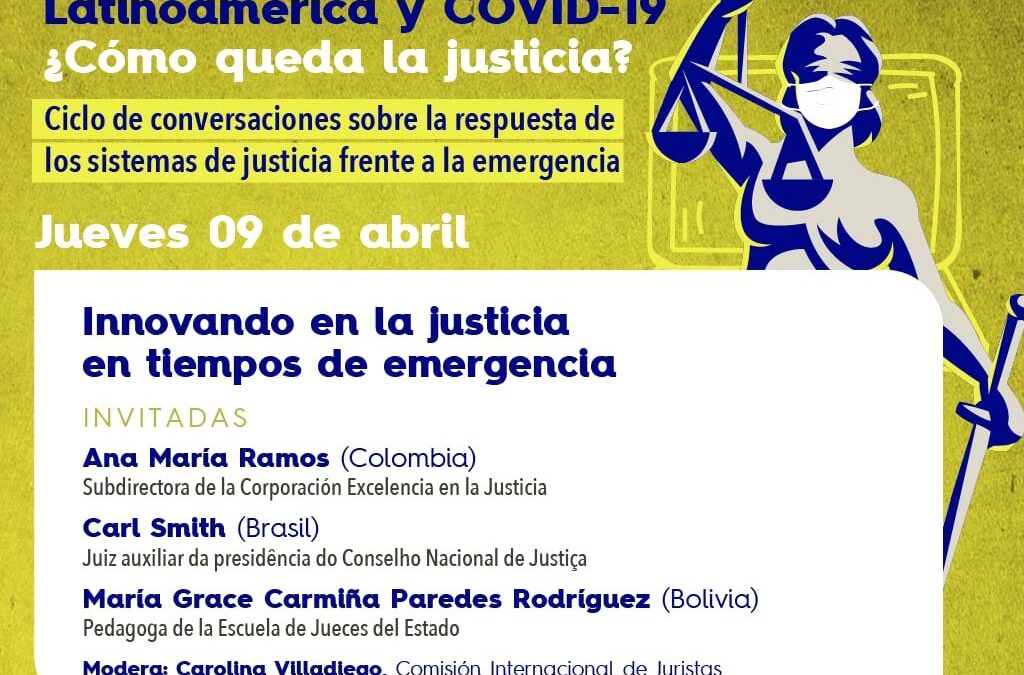
Apr 9, 2020 | Events, News
Various States in the Latin American region have adopted exceptional measures to address the pandemic and manage the health crisis. These measures impact peoples’ human rights and freedoms. A series of webinars will cover this topic. The third one takes place today.
Access to justice and the right to an effective remedy are particularly at risk. In that regard, it is worth analyzing: How are justice systems reacting to the pandemic? What is required to continue guaranteeing access to justice, especially for those people and groups most vulnerable? How does this pandemic affect the provision of services in the justice sector? How can justice systems innovate to respond to this situation?
In order to address these questions, the ICJ together with DPLF, Fundación Construir, Fundación Tribuna Constitucional, Observatorio de Derechos y Justicia, and Fundación para la Justicia y el Estado Democrático del Derecho, supports an initiative of webinars led by a group of women human rights defenders in Latin America.
The webinars will be held in Spanish and through the Zoom platform. Registrations for each webinar can be made by sending an email to info@dplf.org Registered persons will receive the zoom link where the activity can be followed.
The first three conversations are as follows:
- Essential justice services in times of emergency: Thursday 02 of April
At: 14.00 México-Central America/ 15 hours Colombia-Perú-Ecuador/ 16.00 Washington-Bolivia/ 17.00 Chile -Argentina/ 22.00 Geneva
- Working from home and being a judge: challenges for women that are judges: Tuesday 07 of April
At 14.00 México-Central America/ 15.00 Colombia-Perú-Ecuador / 16.00 Washington-Bolivia / 17.00 Chile -Argentina/ 22.00 Geneva
- Innovating in the justice system during times of emergency: Thursday 09 of April
At 14.00 México-Central America/15.00 Colombia-Perú-Ecuador/ 16.00 Washington-Bolivia/ 17.00 Chile -Argentina/ 22.00 Geneva
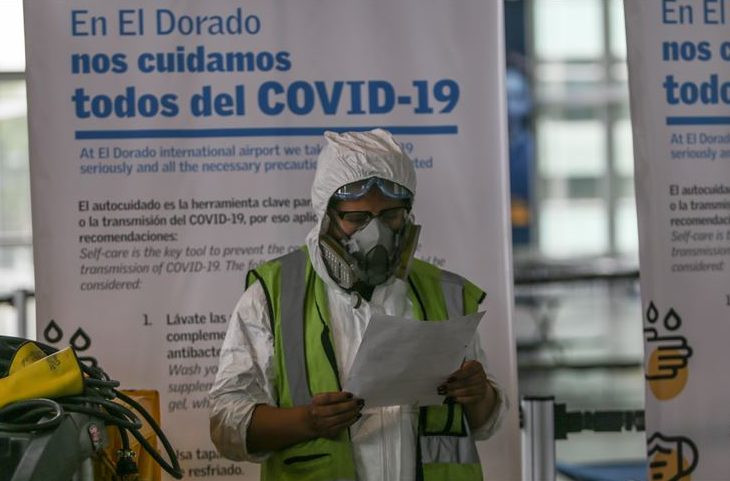
Apr 8, 2020 | Noticias
Por décadas, un número importante de colombianos han sido víctimas de crímenes atroces relacionados con el conflicto armado. En particular, los defensores de derechos humanos han sido blancos de violaciones de derechos humanos y abusos serios, como asesinatos, amenazas de muerte y hostigamientos.
Solo este año, la Oficina de la Alta Comisionada de las Naciones Unidas para los Derechos Humanos (ACNUDH) ha recibido información sobre 56 posibles casos de asesinatos de defensores de derechos humanos. Desafortunadamente, el brote del COVID-19 no ha detenido la violencia contra defensores de derechos humanos.
Al respecto, desde el primer caso confirmado de COVID-19 en el país, el 6 de marzo de 2020, la Organización de Estados Americanos (OEA) y Amnistía Internacional han reportado el asesinato de seis defensores de derechos humanos. Los perpetradores de estos crímenes todavía no han sido identificados.
En igual sentido, las violaciones de derechos humanos y abusos contra comunidades locales tampoco se han detenido. A decir verdad, lo contrario parece ser lo cierto. Así, por ejemplo, se ha denunciado que grupos armados ilegales, incluyendo grupos paramilitares y nuevos grupos formados por disidentes de la guerrilla de las FARC-EP, están aprovechado la pandemia para cometer acciones ilegales con mayor libertad, principalmente en áreas rurales del país. Entre las acciones cometidas por estos grupos, se destaca el desplazamiento forzado de 250 personas y el confinamiento de 770 familias por los combates entre un grupo paramilitar y un grupo guerrillero. Ambas acciones tuvieron lugar en la región pacífica del país, en la cual el conflicto se ha intensificado luego del Acuerdo Final de Paz. Adicionalmente, se conoce de al menos tres desmovilizados de las FARC-EP que han sido asesinados en marzo de 2020.
A pesar de la gravedad de la situación anteriormente descrita, la respuesta del gobierno colombiano a la crisis provocada por el COVID-19 se ha centrado en la creación e implementación de medidas no relacionadas con el conflicto. Al respecto, el gobierno ha decretado regulaciones de gran importancia para mitigar los efectos sociales y económicos creados por el virus. Entre otras regulaciones, el presidente decretó un estado de emergencia y una cuarentena nacional obligatoria por 19 días desde el 25 de marzo de 2020. De igual forma, el gobierno estableció una serie de ayudas sociales y económicas en favor de quienes se verán más afectados por la cuarentena.
Ninguna de estas medidas fue diseñada considerando la situación particular de los defensores de derechos humanos. Como consecuencia, su protección no es un elemento central de las políticas colombianas para hacer frente a la pandemia. Si se considera que la implementación del Acuerdo Final de Paz y los derechos de las víctimas no son prioridades del actual gobierno, el enfoque adoptado no es completamente inesperado. En todo caso, para ser justos, se debe reconocer que los programas estatales para la implementación del Acuerdo han continuado operando durante la pandemia.
Ahora bien, podría argumentarse que la pandemia tiene el potencial de afectar predominantemente derechos humanos que no están relacionados con el conflicto armado. Por lo tanto, desde este punto de vista, la priorización de medidas no relacionadas con el conflicto armado está justificada y es requerida. Si bien esta posición se basa en una premisa valida, que es que la pandemia causada por el COVID-19 crea varios desafíos que van más allá de los problemas de derechos humanos relacionados con el conflicto, ignora un elemento central de la realidad colombiana: la existencia de un conflicto en curso.
Actualmente, el conflicto afecta directamente una parte considerable de la población colombiana, incluyendo la mayoría de los defensores de derechos humanos. Sobre este tema, fue reportado que, el año pasado, las acciones cometidas por grupos ilegales en el marco del conflicto afectaron a al menos 10 de los 32 departamentos de Colombia. En ese sentido, ignorar la importancia del conflicto puede llevar a que algunas medidas para hacer frente a la pandemia resulten ineficaces. Lo anterior, ya que, en las zonas afectadas por el conflicto, la protección de los derechos humanos requiere abordar los desafíos específicos que la pandemia ha creado en esos territorios. Por ejemplo, la presencia de grupos ilegales puede conllevar a que no se realicen pruebas para el COVID-19 a los miembros de las comunidades locales o que no puedan acceder a servicios de salud. Igualmente, debido a la cuarentena, los grupos ilegales pueden identificar más fácilmente la localización de defensores de derechos humanos y tomar represalias contra ellos.
En relación con los defensores de derechos humanos, también debe mencionarse los problemas relacionados con el acceso a medidas de seguridad adecuadas. Sobre este tema, Amnistía Internacional ha denunciado que los esquemas y medidas de seguridad de algunos defensores de derechos humanos han sido reducidos por la pandemia. De igual forma, una organización no gubernamental local expresó preocupación por la decisión de la Unidad Nacional de Protección de suspender indefinidamente las sesiones de la Comisión en donde se definen las medidas de protección.
En consideración con lo anterior, y más allá de las consideraciones políticas y de las prioridades generales del gobierno, es imperativo que el gobierno adopte una perspectiva integral para enfrentar la pandemia. Esto implica abordar el impacto diferencial que la pandemia puede tener en las personas que lideran los procesos de transformación social y legal, en las zonas afectadas por el conflicto. En particular, deben implementarse o adaptarse medidas eficaces de protección para defensores de derechos humanos durante la crisis del COVID-19. Asimismo, deben garantizarse y cumplirse los derechos de acceso a un recurso efectivo y a la reparación, de conformidad con los estándares internacionales.
Adicionalmente, el gobierno nacional debe hacer mayores esfuerzos para obtener un cese de hostilidades humanitario por parte de todos los grupos ilegales durante la crisis del COVID-19. Un cese de hostilidades humanitario contribuiría a (i) proteger a la población civil contra actos violentos, (ii) implementar las medidas relacionadas con la pandemia en las zonas de conflicto y (iii) evitar la proliferación del virus en comunidades vulnerables. Esta es una medida crucial que ya ha sido solicitada por organizaciones civiles nacionales, el jefe de la misión de verificación de Naciones Unidas en Colombia, la OEA y algunos parlamentarios. Hasta la fecha, solo un grupo armado ilegal ha aceptado un cese de hostilidades: el Ejercito de Liberación Nacional (ELN), la guerrilla activa más grande en Colombia, la cual decretó un cese al fuego unilateral durante abril.
En conclusión, reconocer la importancia del conflicto es esencial para hacer frente a las implicaciones en los derechos humanos creadas por las crisis del COVID-19. Esto es necesario para contar con políticas integrales que enfrenten la pandemia, así como para asegurar que los problemas y necesidades en las zonas afectadas por el conflicto no sean desconocidas y agravadas durante la crisis del COVID-19. Sobre este punto, como recientemente fue afirmado por el Secretario General de Naciones Unidas, debe tenerse presente que las personas más vulnerables durante un conflicto son también quienes tienen mayor riesgo de sufrir pérdidas devastadoras como consecuencia de esta pandemia.









